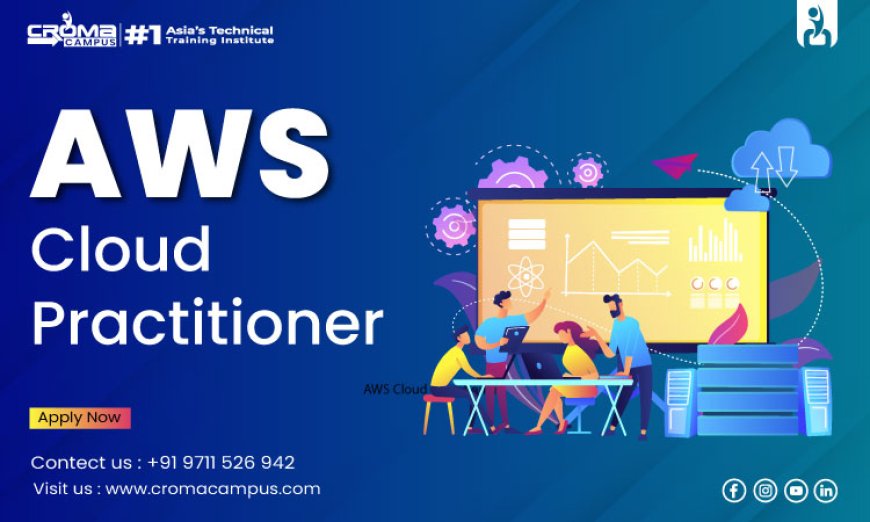What Is The Role Of An AWS Certified Cloud Practitioner?
An AWS Certified Cloud Practitioner is essential in understanding and leveraging Amazon Web Services (AWS) for business needs.

Introduction
An AWS Certified Cloud Practitioner is essential in understanding and leveraging Amazon Web Services (AWS) for business needs. This entry-level certification validates foundational knowledge of cloud concepts, AWS services, security, and cost management. Practitioners play a critical role in guiding organizations through the basics of cloud computing, facilitating effective decision-making, and ensuring optimal use of AWS resources. Their expertise bridges technical and non-technical stakeholders, fostering successful cloud adoption.
Role Of An AWS Certified Cloud Practitioner
An AWS Certified Cloud Practitioner plays a fundamental role in an organization by understanding the core principles and services of Amazon Web Services (AWS). This certification validates foundational knowledge of AWS cloud concepts, security, architecture, pricing, and support.
1. Introduction to AWS Cloud Practitioner Role
The AWS Certified Cloud Practitioner is the entry-level certification offered by AWS. It is designed for individuals seeking to understand the basic concepts of cloud computing. This certification is suitable for non-technical roles or those new to cloud technology, including sales, marketing, project management, and executive positions.
2. Fundamental Understanding of AWS Cloud
A primary responsibility of an AWS Certified Cloud Practitioner is to grasp the basic architecture and principles of cloud computing. This includes knowledge of the AWS global infrastructure, such as regions, availability zones, and edge locations. Practitioners need to understand how these components work together to provide scalable, reliable, and cost-effective cloud services.
3. Knowledge of Core AWS Services
AWS offers a vast array of services, and an AWS Certified Cloud Practitioner must be familiar with the core services. These include computing services like EC2 (Elastic Compute Cloud), storage solutions like S3 (Simple Storage Service), and database services such as RDS (Relational Database Service). Understanding these services helps practitioners recommend appropriate solutions for various business needs.
4. Security and Compliance Awareness
Security is a critical aspect of cloud computing. The AWS Certification training helps one understand the shared responsibility model, where AWS manages security of the cloud, and customers manage security in the cloud. Practitioners should be aware of AWS security services like IAM (Identity and Access Management), encryption methods, and compliance programs to ensure data protection and regulatory compliance.
5. Cost Management and Pricing Models
Effective cost management is crucial for organizations leveraging cloud services. An AWS Certified Cloud Practitioner should be knowledgeable about AWS pricing models, including pay-as-you-go, reserved instances, and savings plans. Understanding these models enables practitioners to provide cost-efficient solutions and optimize cloud expenditure. They should also be familiar with tools like AWS Cost Explorer and AWS Budgets to monitor and control costs.
6. Deployment and Operations
While AWS Certified Cloud Practitioner are not expected to deploy and manage services hands-on, they should understand the basic concepts of deployment and operation. This includes knowledge of deployment models like public, private, and hybrid clouds, and understanding how services are provisioned and scaled in the AWS environment. This foundational knowledge supports collaboration with technical teams.
7. Cloud Architecting and Best Practices
AWS Certified Cloud Practitioners should understand the basic principles of cloud architecting. This involves knowledge of best practices for designing and deploying scalable, secure, and resilient applications on AWS. Understanding the AWS Well-Architected Framework, which includes operational excellence, security, reliability, performance efficiency, and cost optimization, is essential for making informed decisions.
8. Customer Support and Documentation
An important aspect of the AWS Certified Cloud Practitioner role is familiarity with AWS support plans and resources. This includes understanding the various levels of AWS Support (Basic, Developer, Business, Enterprise), and knowing how to access and utilize AWS documentation, whitepapers, and training resources. This knowledge ensures that practitioners can guide users to appropriate support channels and resources.
9. Communication and Collaboration
AWS Certified Cloud Practitioners often act as a bridge between technical teams and non-technical stakeholders. Effective communication skills are crucial for translating complex technical concepts into business-friendly language. This ensures that all stakeholders understand the benefits and implications of AWS services, facilitating better decision-making and collaboration across the organization.
10. Continuous Learning and Development
The field of cloud computing is rapidly evolving, with new services and features being introduced regularly. AWS Certified Cloud Practitioners should engage in continuous learning to stay updated with the latest developments in AWS. This can be achieved through ongoing training, attending AWS events, participating in webinars, and following AWS news and updates.
Conclusion
The role of an AWS Certified Cloud Practitioner is integral to organizations leveraging AWS cloud services. They provide foundational knowledge of cloud concepts, services, security, cost management, and best practices. The AWS Certification is a valuable credential that increases the value of aspiring professionals significantly. By understanding and communicating these elements, they support informed decision-making, effective cost management, and successful cloud adoption. Continuous learning ensures they remain valuable resources in the ever-evolving cloud landscape.
What's Your Reaction?




























